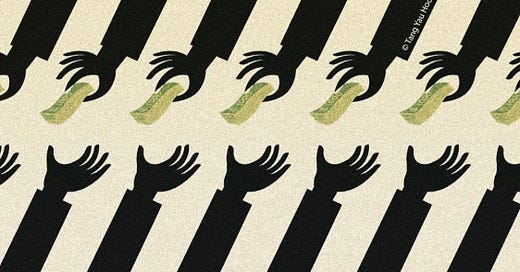A friend of ours posed an interesting question. He was planning a tropical vacation and deciding whether to book the nicest resort on the island or a less-luxurious-but-still-nice family-friendly hotel. Money is not an issue. He just didn’t want his son, the same age as our older daughter, to believe he would always travel in such luxury. In other words, he hesitated to normalize that experience before his son could really understand the hard work it took to have it.
I think all generations want to do as well as their parents did, if not better. As a derivative of that sentiment, many of us want to give as much to our children as we had, if not more.
I am no exception. I am guilty of spoiling my kids, so let’s get that out of the way up front. I don’t belong atop a moral soapbox on this issue but find it crucial to examine nonetheless.
Our digital world is producing the most discerning generation of parents ever, which poses a question: who benefits the most when we raise the floor for our children? Are we doing it for them or for us?
Story time. When I was a kid, my dad was the sales manager for radio stations around Philadelphia, and my Pop-Pop was cronies with the entire Flyers organization from working in the jewelry business and then for Pepsi. Because of this, I walked into every special event the city had to offer: I shook hands with artists backstage. I sat in the suites for playoff games. I took my girlfriends to see the Backstreet Boys without even having tickets. While far from a nepobaby, I was privileged in access. Nothing in my adult life will ever come close, and even though I knew these experiences were special, I had no way to contextualize how special they were.
Taylor Swift’s Eras Tour has me thinking a lot about that time in my life. I would have been there, sitting in my dad’s seats or walked in by Pop-Pop’s security friend to dance in the open aisles. A kid so fortunate without even realizing it. I didn’t try very hard to find tickets for this tour, because decent seats were outside the price range of what seemed “worth it” to me (which is, of course, subjective). But I am noticing how many women are bringing their daughters, who are close in age to my own daughter. I am sure these kids love Taylor. But I’m not sure they understand what a privilege it is to be there.
Some of this feels like the typical stuff of growing up. When our kids reach a certain age, we task them with becoming more aware of their own luck and fortune. We fumble around the ways to teach them gratitude, hoping our methods will stick.
But we are visible generation, raising visible kids. We are more cognizant of what appears to have value, and therefore, subconscious status signaling seeps into our choices all the time. This includes choices for young kids who are none the wiser. Perhaps it’s because we like to demonstrate to the world we’re giving them our all. Snippets of abundance—so often material and/or shared online—reassure us we’re doing enough, even though enough is a bar that keeps on rising.
Think about all the professional family photoshoots. Themed birthday cakes that belong on the Food Network. Matching sweatsuit sets that read something ostentatious like Hamptons Tennis Club (my daughter has neither been to the Hamptons nor played tennis there, and yet). Candy bouquets and Squishmallows and custom spirit wear. These are just some of the spoils I’ve indulged my children in without much thought. If I had to examine why, I could only guess that I equate these performative acts with demonstrations of love. And until now, having a seven-year-old daughter, I did not think about how projecting abundance would rub off on her.
Just as our friend questioned his vacation plans, I am realizing that we teach them the lifestyle. The lessons come from us.
Despite the fact that my husband is literally one of the top financial advisers in the country, I still sometimes feel as though we’re fumbling the ball around money and our kids. We tried incentivizing our daughter to assume more household responsibilities by offering her an allowance, but she doesn’t seem to care about earning money. She knows that money would buy her discretionary items like stickers and jewelry at Claire’s, but we still buy everything she needs and most of what she wants. Like many of her peers, she exists in a state of perpetual abundance: infinite ways to stream content, sites to complete purchases at the click of a button, and apps for quick fixes when things go wrong. Even her little sister reminds us when something gets ruined, “That’s okay, Mommy can go on Amazon and order another.” It’s cute but kind of gross that this is what she knows.
On one hand, it’s not fair to expect young children to identify specific examples of privilege on their own. I worry that in harping on prices and what we deem expensive, I’m teaching them more about classism than gratitude. Because right now, my girls are just as happy with their $10 outfits from Target as they are with their $60 sweatsuit from Nordstrom’s. The grocery store sheet cake tastes better than the custom creation (as my daughter’s friends had no problem telling me). Kidz Bop tickets are almost as good as a Taylor Swift concert. They don’t know they’re in designer sneakers until we, or the internet, tell them. We can’t attempt to teach gratitude within this construct when we chose to set this standard for them.
My daughter learns better through scarcity than abundance.
In the first two weeks of camp, she somehow lost three pairs of goggles; all the good Speedo kind she prefers. One pair was fine. The second, we lectured her. The third required a lesson. I told her we aren’t buying anymore of the ones she liked. They are too expensive to keep replacing them. She could go to the lost and found and search for them, and use an old brandless pair for a while until she can keep better track of her belongings. Obviously, this didn’t go over well. But she hasn’t lost any since, and even found a pair that were gone.
I don’t have the answers here—there is no right or wrong. I can’t judge anyone for the lifestyle they choose to share with their children and when. The only person I can judge is myself, which I am doing the hardest.
All that matters is that we understand these privileges and our children’s perception of them are borne from decisions. Every single one of them. We are weaving the fabric of who they are, each thread a choice that was made. We can’t pick those out of the sweater later on, so maybe now is the time to care what they’re made of.
Do you ever wonder where to draw the line? Like me, do you cross it all the time? LMK: averagejoelle3@gmail.com or comment below.
The little things
If you follow me on social, you already know I sustained a high-ankle sprain playing tennis on July 4th. Since overcoming the initial embarrassment of being laid out in front of my friend and her family, I’ve been nursing this bread loaf at the bottom of my leg back into a foot. No weight bearing, no driving, no anything. It absolutely sucks but could have been worse. On the bright side, my “Redemption from Athletic Injury” narrative is my whole personality now. If you have any good exercise routines for people who can’t weight bear, please reach out :)
The day before it happened, I went paddle boarding in the bay for the first time and really enjoyed it. Here’s my little flamingo showing us her best warrior pose after our successful voyage on the boards.
Also
I wrote:
Here about how my daughters changed my relationship with my mom for the better, and I’m so pleased that Motherly is giving the essay new life!
I read:
The Glamorous Stranger Next Door Knew Everything. And She Needed Help. - The New York Times
On Soft Ambition – Marie Claire
Damn the Man, Contemplations on Authority – Every Shade of Grey
All Aboard the Ship of Screams – The Cut
I bought:
The dumbest-yet-most-exciting item I could find on Prime Day, a retro Igloo insulated fanny pack. Now I can scoot around town with my bevvies chilled.
I joined:
Threads, because I’m better with words than pictures. You can follow me there.
Your wins
Lindsey is on the job hunt and decided to use AI to help improve her resume. She now has four first-round interviews scheduled. Good luck, Lindsey!






Easily one of the best reads for parents on here.
Great points to consider! I often wonder if we are doing too much for our kids. Thanks for this thoughtful piece.